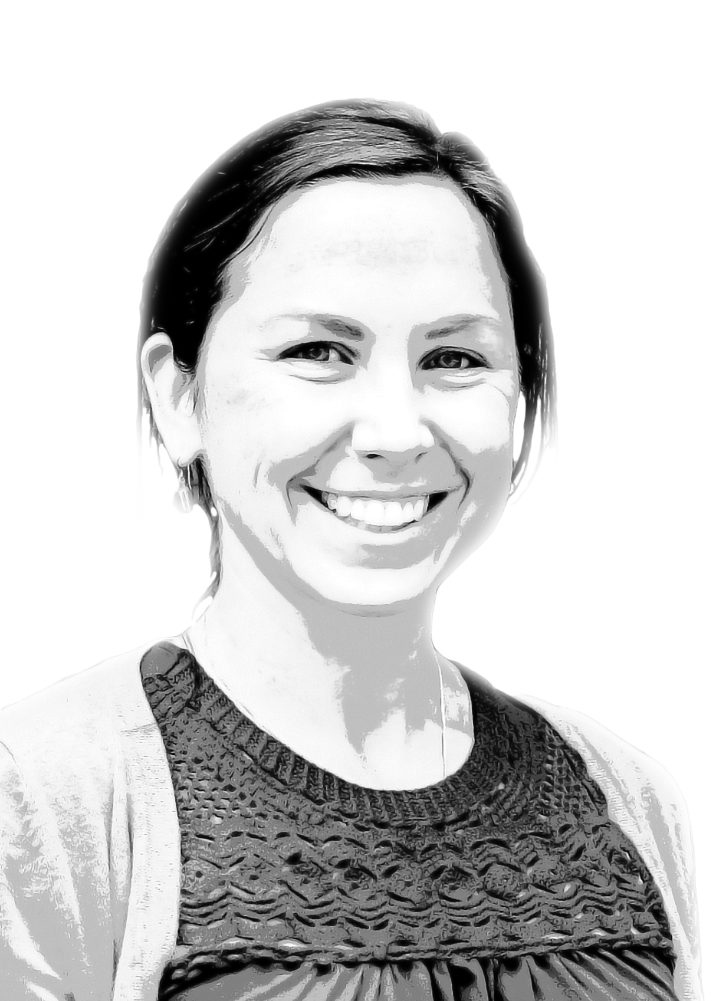
Food Activism, the Sociology of Knowledge and First Foods: An Interview with Erica Morrell

This is part of our Campus Spotlight on Middlebury College.
Food has become an academic field increasingly sought after by students and researchers as it allows for not only fruitful interdisciplinary cross-overs, but also personal introspection about subjects that exceed the scope of food concerns per se. In this interview for Campus, and in conjunction with her teaching syllabi in sociology shared in this special feature, Erica Morrell explains how she came to realize that food could enable her to merge her interest in the environment and personal background in political advocacy with her career goals as a scholar studying social movements. Food stands at the crossroad of the physical and social sciences, such that its many facets offer multiple points of entry into a slew of research areas, from social and environmental justice topics, to health, gender, or youth studies, among countless others. Erica Morrell reminds us that nothing is to be taken for granted when it comes to food because it is deeply sociological and political. Thus, it constitutes the ideal arena to examine how different scales intersect, from the intimate realm of the body to global institutional structures. In describing here some of her classroom and fascinating fieldwork experience, she shows that not only food engages every human being from time of birth, but also that the study of food systems can serve to boost analytical competencies so we can better expose issues of exclusion, inequalities and uneven power dynamics, as well as highlight that food production, distribution, and consumption have a role to play in the global efforts towards alleviating environmental degradation and its consequences on human societies.
—Hélène Ducros for EuropeNow
EuropeNow Could you tell EuropeNow readers how you came to study food and what you find most compelling about it?
Erica Morrell I grew up in rural New Hampshire, and I was always interested in things like the environment and gardening. I was also raised in a family that was very politically active. My mother was a political refugee from a former communist country, and my father, who grew up in Queens, New York, was an anti-Vietnam activist. I went to college intending to study biology or environmental science. That was around the time of 9/11 and the invasions of Iraq and Afghanistan. I had been active protesting the war. I thought of my interest in the environment and my interest in politics as two separate things. I saw politics as a side interest, a hobby outside my career goals. Then, I learned more about protests against genetically modified foods around the world, in India, Europe, and South America. As I learned more about the politics of food and food activism, I realized that there was a way to unite my interests in the environment and in politics, instead of keeping them separate. Food was the common bond between the two.
EuropeNow You earned your PhD in sociology. Why did you pick sociology as the way to answer the questions you had about food? Could you explain the sociological perspective on food issues and what is specific about this particular approach, as well as how it might intersect with or complement other disciplinary perspectives?
Erica Morrell As an undergraduate, I took a sociology class where I learned about C. Wright Mills’ sociological imagination, which is defined as the awareness of the relationship between personal experience and wider society. It is through my personal experiences in political activism and gardening that I was drawn to the global politics of food. Through a sociological lens I not only understood myself better, but I also understood the world better. Sociology gives you that dual perspective that allows you to relate almost anything in the world to your individual experience to understand why things are the way they are. Sociology can help with the personal and the political. Sociology helps us understand how wider social structures shape food, including individual consumption, access, and production. So, it helps us understand how individual food consumption is shaped by wider forces. Vice-versa, it also helps in understanding how our individual acts of consuming or producing food affect society.
I have a dual PhD in sociology and public policy, so I pay attention to the links between policy and food. Food access, policies of international trade, US agricultural subsidies, these all shape what we end up with on our plates. There are many other angles. Many people today speak about public health and the relationship between food consumption and health. So we can think of food and health together. You can also think of social justice. Many communities on the ground are protesting for access to food production or look at production itself as a form of social and political resistance. Ultimately, you can tie anything to food, whether it is international relations, social movements, health, or policy. When we talk about food, we are talking about many intersecting fields of study.
EuropeNow How do you explain the rise and popularity of food studies programs in the US at this particular juncture? Is it about the foodie culture influence or is there something else at stake?
Erica Morrell I think it is mix. When I started thinking about food, I might have been considered part of the foodie movement. In 2004, the film The Future of Food came out, at the same time as the film Supersize Me. Both were greatly popular and were about the politics of food, food consumption and health. Three years later Michael Pollan published the best seller The Omnivore’s Dilemma. So, because of these cultural changes and what was included in the films, many academics started to be more interested in examining food and the foodie trend. Society was ahead of academics. Certain academics woke up to the importance of food because of the foodie movement, and, once they did they realized the complexities of food and how much they could research that had not been done before. For example, from a social justice perspective, in the 1970s, the Black Panther Party was already uniting racial justice activism and food systems engagement through their free breakfast program. This informed the free lunch program in every school in the US today. So at that time, a lot of activists thought about food but academics studying their activism focused largely on the civil rights aspects. Academics were behind the time. They were not picking up on everything that was going on in society. I think the Foodie movement helped wake us up, and now we are realizing so much of what we had missed. I hope it is not a fad in academia. We have realized now that it is an ongoing issue that merits a distinct focus.
EuropeNow How would you actually define what it is to be a foodie?
Erica Morrell That’s a good question. I think that the term is often associated with highly educated white upper class people. It connotes a voting-with-your-dollar luxury that only people with a certain status can access. But many people outside that demographic are also interested and engaged in vibrant food cultures.
EuropeNow Can you tell us a bit about your syllabi and your goals for students’ learning in those courses? What do you enjoy most about teaching food topics?
Erica Morrell Overall, my goals are the same as those of many sociology professors. I want my students to hone their critical thinking and writing skills, and to be able to analyze social structures. I use food to do that and to explore relationships between society and individuals. We all eat food so it is a great, common starting point to teach students about differences in society—about income inequality, racial disparities, globalization and its disproportionate impacts. It often does not matter where we are from, we still use food to socialize with family and community, and we celebrate or mourn with food. It is part of our spiritual and cultural rituals. In every culture, we all understand the intimate aspects of food. We have that familiar connection with food. That familiarity is a great learning tool because it makes sense to students, it is a shared starting point we all arrive to class with. From there we can analyze things students may not understand as well, and they always have this familiar foundation as a jumping off point. For example, most of my students at Middlebury are from upper income households. Eighty-five to ninety percent come from families that are in the top 20% of income level in the US. So, some of these students may not understand what it is like to live in poverty. With food, they can better imagine the difficulty of poverty, of not knowing what you will eat tomorrow, and from this more empathetic starting point, they become more vested in understanding why poverty happens, what structures shape it. It becomes very personal and exciting for them to learn and think critically about these wider social structures because they understand it has real implications.
EuropeNow Who are your students? Do they usually have career goals that pertain to food in one way or another? Why do they pick a course on food?
Erica Morrell There are certainly some students who are thinking about doing something related, but the majority of my students want a fun elective. A lot of them are biology or economics majors, so that this may be the only sociology course they take. Something that has food in it sounds fun, so they take it. It’s a responsibility for me because I see it as that one opportunity to get them to think sociologically, to help them develop that sociological imagination. I enjoy the opportunity to witness the exciting moments when students start thinking about something in new ways.
I also have students who go into research around food systems, perhaps working for a government entity or policy-makers working on the Farm Bill. But, if they go into food systems work, the majority go into non-profit and advocacy work around food justice or food insecurity, either nationally or locally. Some also go into agricultural production and farming, as part of the recent wave of entrepreneurship around urban food production.
EuropeNow What is your current research focus? You told me that you were writing a book. How exciting! Can you share what you are investigating in the book?
Erica Morrell My broad interests lie in social movements and the politics of knowledge. We often talk about the material foundations of social movements, especially when looking at ways people protest and mobilize. I am more interested in the dynamics of knowledge embedded within this. What knowledge do activists develop and deploy in their struggles? How do they use their experiences to make sense of the world and motivate their activism?
While doing my dissertation research on contemporary activism in relation to Detroit’s food system, I came upon an advertisement in the Food Policy Council’s Newsletter for the Black Mothers Breastfeeding Association. I had never really thought about breastfeeding or infant food consumption in my research on food activism and food systems. Then I realized that most people talking about food systems are not talking about infants, either. But certainly young children are part of the food system, and the foods they consume link to many parts of the food system. Infant formula is comprised of farmed ingredients, for example, like milk and soy. And there are many structural and cultural barriers that constrain how caregivers feed, ultimately impacting equitable infant food access in this country. So, I became very interested in food justice in terms of “first foods”—human milk and manufactured infant formulas. This led me to my current research, my current book, on “first food justice” and the wave of activism in the last decade that addresses disparities in infant food consumption. I am interviewing and working with groups like the African American Breastfeeding Network, Navajo Nation Breastfeeding Coalition, Reaching Our Sisters Everywhere, and Indigenous Women Rising, all these different efforts that women of color are leading to increase breastfeeding rates in their communities in order to reclaim their culture and food sovereignty, to reclaim their cultural values and knowledge.
This first food justice project is very interesting to me in part because there are many parallels to what we often talk about in the context of other parts of the food system. For example, a lot of food justice movement research addresses labor—how black people were forced to work in the fields during chattel slavery, how migrants comprise the dominant agricultural labor force in America today, and how, nonetheless, people of color have been denied access to positions of power in the food system systematically and throughout history. It’s very similar with breastfeeding. Black women were forced to wet-nurse white babies, for example, so that black people were systematically denied access to mothers’ milk while white babies got full, contributing to disparities today. The same is true of many indigenous communities. And now our society perpetuates other mechanisms that constrain and enable labor and infant feeding in ways that foster racial disparities, economic disparities, health disparities. That we have largely omitted first foods from food studies research is itself emblematic of the oppression here, including in terms of race as well as gender. We’ve omitted this huge area of women’s labor and the realities of many people’s experiences by not considering first foods in our work. But we were all infants at one point and eighty five percent of us will be parents and will provide food to our infants in one form or another eventually. So this is much more of a universal issue than we may tend to think.
Ultimately, my project brings these issues to the fore. It especially seeks to link historical and ongoing dynamics of oppression with current activism by disadvantaged women. These women are finding a way to reclaim very personal and important aspects of food access and equity in their communities. You can read more about my thoughts on the subject in my articles in the journal Environmental Justice and in Breastfeeding Medicine.
EuropeNow What do you think are the next frontiers in food studies in the 21st century?
Erica Morrell My personal interest is in the dynamics of food justice. I think that one of the next big issues will be workers’ justice. In food studies, we speak a lot about justice when it comes to consumption, who has access to food, but we still have not fully unpacked food production and aspects of justice therein. Not only is it about farmers and agricultural labor, but it is also about who works in restaurants, who works in the back of restaurants versus who makes good tips in the front of the restaurant, who owns restaurants or grocery stores, and the power dynamics of ownership throughout the food system.
I also think that gender will be a big issue. When researching in Detroit, I found that we talk a lot about class and race when we talk about food justice and food system, but not as much about gender. But food justice has a lot to do with gender dynamics, especially considering that women worldwide make up the majority of farm workers and farm labor force. For example, in India and South America, women are in the fields, in restaurants and other food production facilities much more than men. But in the US, the image of the farmer is still a white man. So, I think we will be looking at these gender dynamics internationally more than in the United States. And, of course, first foods will be talked about much more. Especially once I finish my book.
Finally, there is the climate issue. The realities of the world will force us to think a lot more about food and climate change together. How will climate change affect food production and food security? Who has food is going to shift. We will have climate refugees. How will they eat? Who is going to grow our food? What about economic security for farmers who will have fluctuating seasons? Some years they will do well and others they will do very poorly as these extremes come around more.
EuropeNow What are your thoughts about urban agriculture, city gardening, rooftop food production? In your mind, is that trend a viable solution?
Erica Morrell I am an optimist about that. I think there are wonderful developments there. It won’t be enough of a solution in the face of the many issues we talked about, but I think that erring on the side of helping to make change is a good way to go. Green roofs can produce food but are also important in mitigating climate change. They minimize storm water drain off in big cities and urban areas, which helps the city infrastructure and keeps contaminants out of the water system. There are multiple benefits, in spite of challenges. Urban agriculture is a piece of the puzzle. More and more policy-makers see it as a viable option. It’s also important for community building. I hope it is not a fad and that it is really part of the ongoing conversation. I think it is. We had community gardening movements in the 1970s and the urban gardening movement is just another iteration of that. There is definitely an interest in it, however we call it. Humans are drawn to producing food and more of us live in cities, so more of us will have to produce food. I think it is here to stay and has a lot of potential.
Erica Morrell is a Mellon C3 Postdoctoral Fellow in sociology and food studies at Middlebury College. There, she teaches and conducts research at the intersection of social movements, the sociology of knowledge, and food and environmental justice. She holds a Ph.D. in public policy and sociology from the University of Michigan.
Hélène B. Ducros is the Chair of Research and Pedagogy at EuropeNow. She holds a J.D. and Ph.D. in geography from the University of North Carolina Chapel Hill. Her latest publication in the Journal of Place Management and Development explores how food festivals contribute to place-making.
References:
Garcia, Deborah Koons, Catherine Lynn Butler et al. 2004. The future of food. Mill Valley, CA: Lily Films.
Mills, C. Wright. 1959. The sociological imagination. New York, NY: Oxford University Press.
Pollan, Michael. 2006. The omnivore’s dilemma: a natural history of four meals. New York, NY: Penguin Press.
Spurlock, Morgan. 2004. Super size me. New York, NY: Hart Sharp Video.
Published on September 5, 2018.




